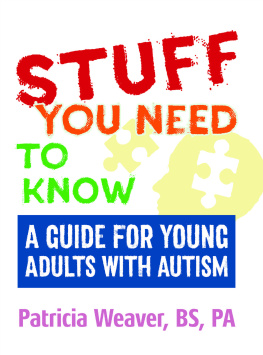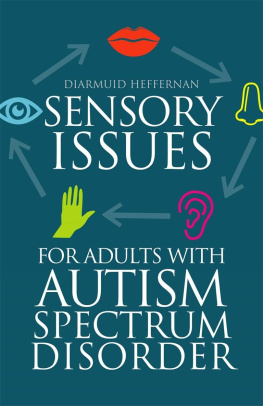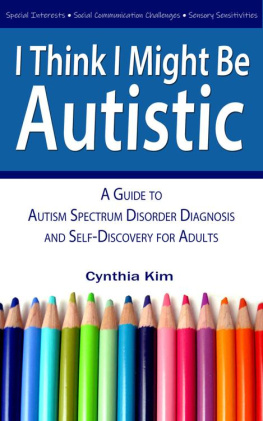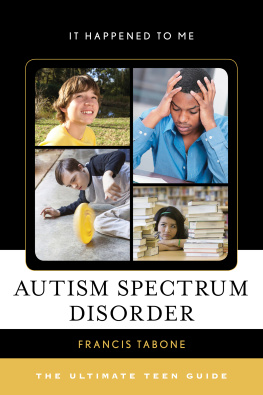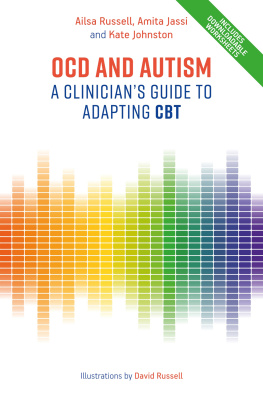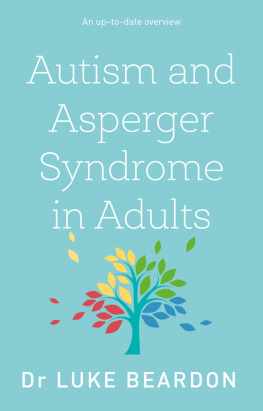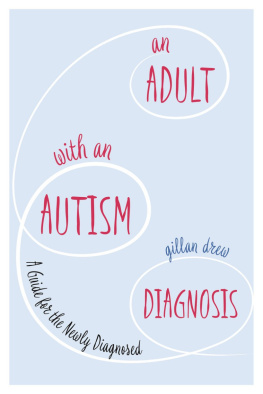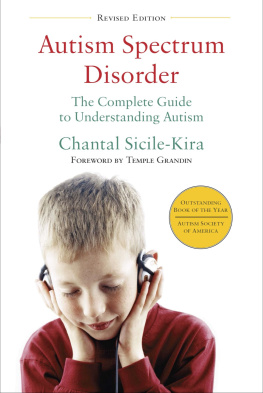Understanding Autism in Adults and Aging Adults
Improving Diagnosis and Quality of Life
Understanding Autism in Adults and Aging Adults
Improving Diagnosis and Quality of Life

Theresa M. Regan, Ph.D., CAS
Neuropsychologist
Certified Autism Specialist
Understanding Autism in Adults and Aging Adults
Copyright 2016 Dr. Theresa Regan
Paperback ISBN - 9781946824004
Hardback ISBN - 9781946824011
Ebook ISBN - 9781946824028
All rights reserved. No part of this book may be copied, electronically or otherwise, without written permission from the author and the publisher.
Published in the United States of America
INDIEGO PUBLISHING LLC
Think Indie. Go Create. Publish.
www.indiegopublishing.com
Editing and Interior Design by Janet Angelo of IndieGo Publishing LLC

Cover Design by Rachel Lopez
www.r2cdesign.com
Also written by Theresa Regan:
Soul Cries
2013 National Indie Excellence Award Finalist
Learn more at the authors website:
www.adultandgeriatricautism.com

Dedication and Acknowledgments
I dedicate this book to my tribe:
The musicians who sing life into my projects,
The listeners who tell me what you hear,
The tenders of the fire who keep the flame burning.
I would like to acknowledge all of the individuals and families navigating the sometimes beautiful and sometimes treacherous road of autism across the lifespan.
You are the inspiration for this book.
I thank and recognize Janet Angelo for editing and publishing the book. Her thread helps tie it all together.
My deepest thanks and gratitude to my family for your support.
And to my husband Patrick and my son Joshua, you bless me always.

Table of Contents

Chapter 1
____________________________________________________
D r. Frank referred seventy-two-year-old Mrs. Canady to my clinic for a dementia assessment. Her husband and children accompanied her to discuss behaviors of concern. They noted that she had unusual beliefs that persisted even when they attempted to dissuade her through solid reasoning and evidence. She had no mental health history, and her check-up of thinking skills in our office was completely normal.
During further in-depth conversations with Mrs. Canady and her family, it became clear that she had always had a reputation for being a good listener. She listened intently when others were speaking, but she rarely contributed.
All throughout her life, she had demonstrated unusual beliefs and had struggled to understand the motives of others. Mrs. Canady thought that certain events were deeply meaningful, events that others considered mundane, everyday occurrences.
Her family noted that she had trouble being organized at home, but she was also quite particular and compulsive with certain aspects of housekeeping.
Mrs. Canady appeared pleasant at the appointment and answered my questions freely and openly. She denied having concerns, fears, or sadness. She was taking antipsychotics and antidepressants, and had undergone electroconvulsive treatments for presumed new onset depression with psychotic features, all without any improvement in symptoms.
Given these factors and many other details provided by the patients family, I began to wonder about the presence of certain autism spectrum symptoms, which perhaps had become more prominent with age. Although I did not feel certain she met the full criteria for Autism Spectrum Disorder (ASD), I called the referring physician to discuss this diagnostic possibility and the impact it might have on her treatment.
Dr. Frank let me know that he did not believe Mrs. Canady could be in the spectrum because she was married. (Although there is truth in the belief that individuals in the autism spectrum have fewer intimate relationships than neurotypical individuals, Dr. Frank believed the myth that this one feature alone can determine a diagnosis). He added, Im not really interested in autism spectrum because Im not a pediatric physician. I just want to make sure she doesnt have dementia.
My name is Dr. Theresa Regan, and I am a neuropsychologist. I specialize in understanding how the brains physical structure and function are linked to thinking skills, emotions, personality, and behavior. I have worked in hospitals for over twenty-five years and performed check-ups of brain function in patients with a variety of conditions including dementia, brain injury, infectious diseases, medical confusion, and more. I serve patients ranging in age from the teen years through more advanced ages.
I am a mother. My son was diagnosed in the autism spectrum when he was five years old. He does not have intellectual impairment, and is in a regular classroom at school. As a family, we have participated in many assessments and interventions related to autism. On a day-to-day basis, I have had the privilege of living with my son, seeing his gifts and strengths, and observing the symptoms and challenges as well. Autism is real to me in a way that it may not be to clinicians who have not experienced it in a loved one.
I am a Certified Autism Specialist. Although I had many years of experience in the area of brain-behavior relationships before my son was born, my world opened to new knowledge and understanding of these functions when my husband and I experienced what the developmental condition of autism is like in a child. My experience as a neuropsychologist and a mother have merged and motivated me to pursue training and practical experience in the area of autism with the completion of this additional certification. I am now attuned to the symptoms of autism across the lifespan, and I am aware of the barriers to identifying autism at all stages of life.
Dr. Frank in the scenario above verbalized what many of us think when we hear that someone we know might have autism. Our first reaction is to assume that surely something else must be wrong, something that can be easily managed with a medication or counseling perhaps. We tell ourselves that ASD can be ruled out because the patient readily makes eye contact or enjoys close relationships such as a thriving, happy marriage. But it goes well beyond this. Medical professionals need to know how to recognize autism spectrum disorder in children and in adults of all ages, as ASD is a lifelong condition. It does not disappear with age, and thus, correct diagnosis is absolutely key to improving quality of life.
As with Dr. Frank, however, many doctors assume that if a patient has autism, surely it would have been identified by the school system or a pediatrician when the patient was a child. In that case, it would already be in the patients medical record. It cant apply to my daughter, spouse, or patient, because my daughter makes eye contact, my spouse has a job, and my patient is a grandmother. Even if autism does apply, what difference would it make? Shouldnt we leave well enough alone? Autism cant be cured, and giving someone such a radical new diagnosis might stigmatize him/her.
Next page

